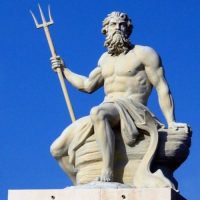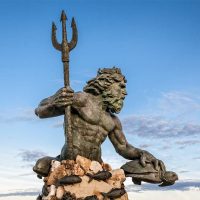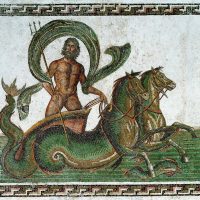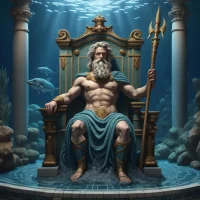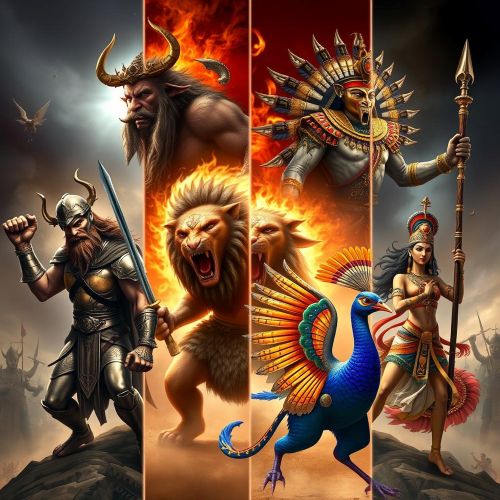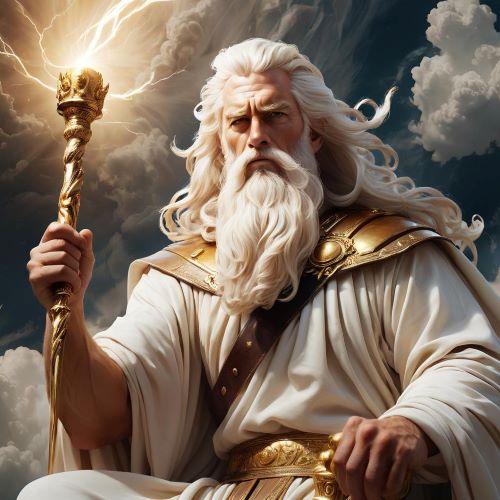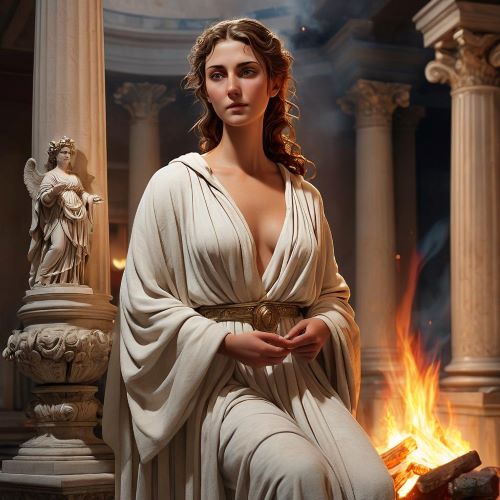Neptune : God of the Sea
Listen
At a glance
| Description | |
|---|---|
| Origin | Roman Mythology |
| Classification | Gods |
| Family Members | Saturn (Father), Ops (Mother), Jupiter, Pluto (Brother), Amphitrite (Wife). Triton (Son) |
| Region | Italy |
| Associated With | Oceans, Seas, Marine Life |
Neptune
Introduction
Neptune, revered in Roman mythology as the god presiding over the seas, earthquakes, and horses, holds a position of eminence akin to his Greek counterpart, Poseidon. As a sibling to Jupiter, Neptune forms part of a formidable triumvirate alongside Pluto, the ruler of the underworld. Armed with his trident and guided by a chariot drawn by creatures of the deep, Neptune commands admiration from mortals and immortals alike. This deity, who governs both freshwater and the vast expanse of the sea, stands prominently in the pantheon of Roman gods. While his origins may exhibit slight variations, Neptune bears an undeniable resemblance to the Greek Poseidon, sharing myriad characteristics and mythological tales.
Physical Traits
Neptune, depicted as a mature man with a dark beard, often holds a trident—a three-pronged fisherman’s spear. Draped in sea-evoking robes, he stands, surrounded by sea-horses, symbolizing his command over the aquatic realm. His flowing beard and wavy hair mirror the sea’s motion, while his piercing gaze hints at his domain’s depths. Adorned with symbols of authority, notably the trident, he asserts mastery over the waters. Whether bare-chested or robed, Neptune’s portrayal underscores his connection with the natural world. In Roman art, he wields the trident, symbolizing control over water and earthquakes, surrounded by sea creatures—dolphins, horses, and fish—emphasizing his affinity with the aquatic realm.
Family
Neptune, son of Saturn and Ops, and brother to Jupiter and Pluto, held a prominent place among the Roman gods. Married to the Nereid Amphitrite, they bore a son, Triton, while Neptune fathered many other children with various partners, mostly sea creatures or monsters. As a sibling in the divine trio alongside Jupiter and Pluto, Neptune ruled over the sea, essential for maintaining cosmic balance. His wife, Salacia, the goddess of saltwater, emphasized his affinity with the marine realm.
Other names
Neptune, also known as Nethuns by the Etruscans and Poseidon in Greek mythology, earned the title “Earth-Shaker” for his seismic influence. Beyond his common moniker, Neptune possessed several aliases reflecting his diverse domains. In earlier incarnations, he was Consus, linked to grain storage and harvest festivities, and Neptunus Equester, symbolizing his ties to horses and chariot races. Epithets like “Father Neptune” and “Lord of the Waters” underscored his mastery over the aquatic realm. These varied titles illuminate the multifaceted essence of this Roman deity, demonstrating his significance across different cultures and epochs.
Powers and Abilities
Neptune’s divine prowess as the sea’s ruler encompassed a potent range of abilities. With his trident, he commanded the ocean’s surface and depths, summoning storms or calming tempests with a mere gesture. Sailors and seafarers sought his favor for safe voyages and abundant catches, acknowledging his sway over maritime fortunes. Moreover, his dominion extended beyond the sea, reaching freshwater sources like rivers and springs, underscoring his role as water’s guardian.
Not limited to aquatic realms, Neptune’s influence extended to horses and freshwater springs. Legend credits him with creating horses from seafoam, highlighting his connection to nature’s untamed forces. His association with freshwater springs further enriches his character, revealing a multifaceted deity embodying both the sea’s turbulence and the vitality of freshwater sources. As the Earth-Shaker, Neptune’s command over water and earth alike solidified his status as a formidable deity, revered by mortals and immortals alike.
Modern Day Influence
Neptune’s influence transcends ancient mythology, weaving into the fabric of modern culture. The discovery of the planet Neptune in 1846 bestowed upon it his name, its deep blue hue echoing the vastness of the sea. The term “Neptunian” denotes anything pertaining to water, underscoring his enduring relevance. In literature and art, Neptune symbolizes the sea’s mysteries and maritime endeavors, permeating creative expressions with his mythic aura.
Beyond scientific discoveries, Neptune’s impact resonates in contemporary art, literature, and cinema. Characters like Aquaman and Ariel draw inspiration from his mythology, embodying the ocean’s power and allure. In the gaming realm, Neptune’s presence is felt as a formidable character in titles like “Smite” and “Final Fantasy XIV,” perpetuating his mythical status in digital realms. Music, too, echoes Neptune’s influence, with songs like “Under the Sea” and “Ocean Man” evoking the ocean’s depths and its connection to mythical figures like Neptune.
In popular culture, Neptune’s legacy endures as a testament to the enduring fascination with the sea and its enigmatic ruler. Through various artistic mediums, his story continues to captivate audiences, reminding us of the boundless wonders and untamed forces of the natural world.
Related Images
Frequently Asked Questions
What is lorem Ipsum?
I am text block. Click edit button to change this text. Lorem ipsum dolor sit amet, consectetur adipiscing elit. Ut elit tellus, luctus nec ullamcorper mattis, pulvinar dapibus leo.
What is lorem Ipsum?
I am text block. Click edit button to change this text. Lorem ipsum dolor sit amet, consectetur adipiscing elit. Ut elit tellus, luctus nec ullamcorper mattis, pulvinar dapibus leo.
What is lorem Ipsum?
I am text block. Click edit button to change this text. Lorem ipsum dolor sit amet, consectetur adipiscing elit. Ut elit tellus, luctus nec ullamcorper mattis, pulvinar dapibus leo.
What is lorem Ipsum?
I am text block. Click edit button to change this text. Lorem ipsum dolor sit amet, consectetur adipiscing elit. Ut elit tellus, luctus nec ullamcorper mattis, pulvinar dapibus leo.
What is lorem Ipsum?
I am text block. Click edit button to change this text. Lorem ipsum dolor sit amet, consectetur adipiscing elit. Ut elit tellus, luctus nec ullamcorper mattis, pulvinar dapibus leo.

